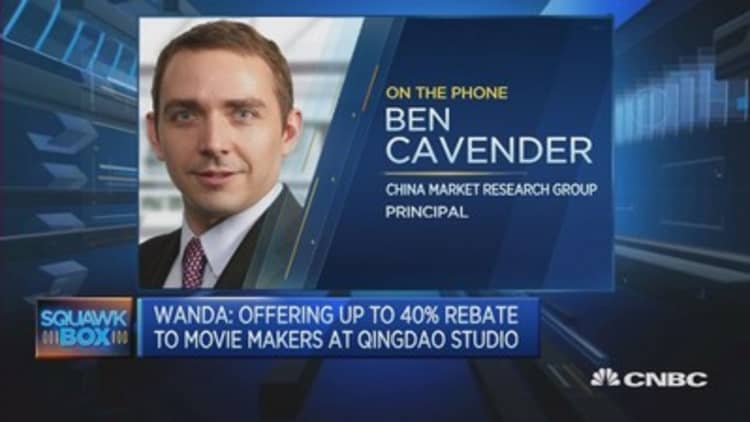Chinese movies posted weaker growth at the box office last year and some companies have even pulled back on their investments in the movie business, but analysts say China's Hollywood dreams are still alive and well.
Recent news has not painted a rosy picture for Chinese firms' film ventures: Chinese smartphone maker Xiaomi announced it was downsizing its film-making division, Xiaomi Pictures, due to internal "adjustments," local media reported in January this year. The company is reportedly closing its film marketing unit and refocusing its energies on phone production after losing market share to other phone manufacturers.
And in December, copper processing firm Anhui Xinke New Materials canceled a deal to buy Voltage Pictures for $345 million, according to entertainment trade weekly Variety. Voltage had financed the Academy Award-winning films "The Hurt Locker" and "Dallas Buyers' Club."
Part of the reason for those retreats could be the discovery of the relatively weak profits in film production.

"The upstream movie studio business has been inferior in terms of profitability versus the downstream cinema business. (It) is likely to stay that way as American studios have multiple ways to monetize their movies — selling DVDs, distributive rights to video-streaming platforms, merchandise — but Chinese studios can only monetize their movies by selling movie tickets," Richard Huang, a research analyst at Nomura, told CNBC.
This pullback, however, should not be regarded as a wider trend for the Chinese film industry, said Wan Yuchen, an analyst at China Market Research Group.
"The film industry in China has been growing rapidly, especially in the last 3 years and (has) attracted investment from many other industries, (including the) internet companies like BAT and Xiaomi," Wan told CNBC in an email, referring to the acronym for China's largest technology companies — Baidu, Alibaba and Tencent.
Nevertheless, Wan acknowledged that last year was a challenging one for the Chinese film industry due to greater levels of competition.
"The competition was fierce, and many companies like Xiaomi and Anhui Xinke failed to survive (in the film sector.) But in the long run, it would still be a trend for large players like BAT and Wanda to invest in the industry through acquisition," she said.

In addition, Chinese film companies were likely impacted by the weaker-than-usual growth figures in box office sales in 2016. The industry experienced the slowest growth in a decade last year, according to EntGroup, a Chinese research company.
Richard Huang from Nomura attributed the slowdown in box office growth to the "lack of quality movies" released last year.
"With a much stronger film pipeline in 2017, we believe there will be a strong rebound in box office growth to 25 percent, compared to 4 percent in 2016. (That) has already started to play out, with January 2017 box office growth recovering to 26 percent," Huang said.
That optimistic outlook has given fuel to Chinese firms pushing ahead with their Hollywood ambitions, with the Dalian Wanda Group among the most aggressive.
The company has kept up a stream of Hollywood acquisitions since 2012 when it acquired American theater chain AMC Theaters. It further increased its footprint in Hollywood when it acquired production company Legendary Pictures and finalized a $1 billion deal to buy Dick Clark Productions last year.
"Dalian Wanda is one of the successful examples of obtaining good content through acquisition. The aim (of acquiring) Dick Clark Productions is to add TV content to Wanda's coverage in the entertainment industry," Wan said, adding that content will be the key to future success of the Chinese entertainment industry.

